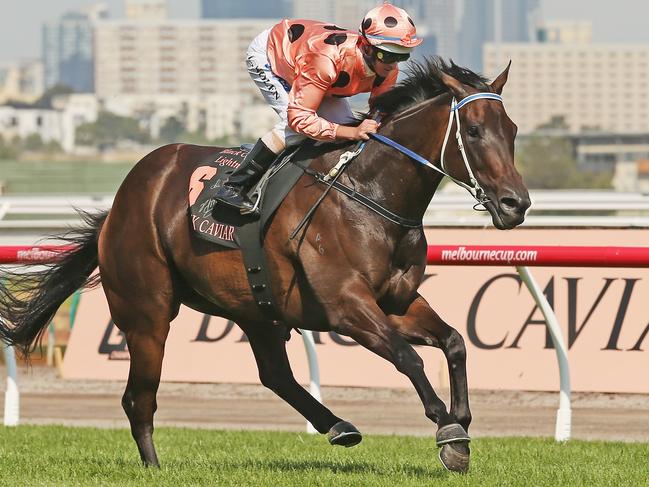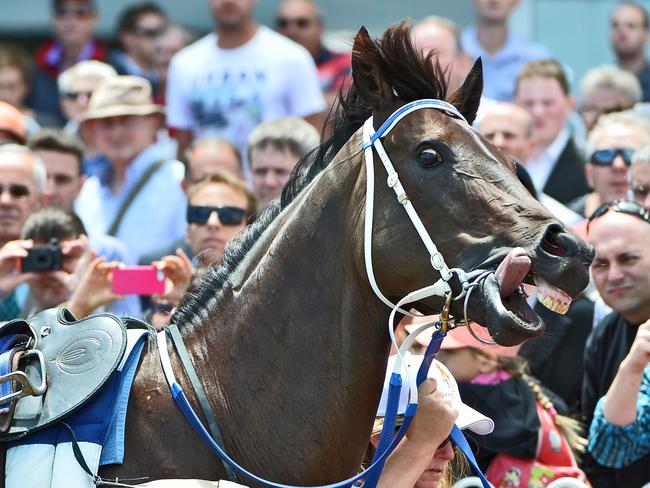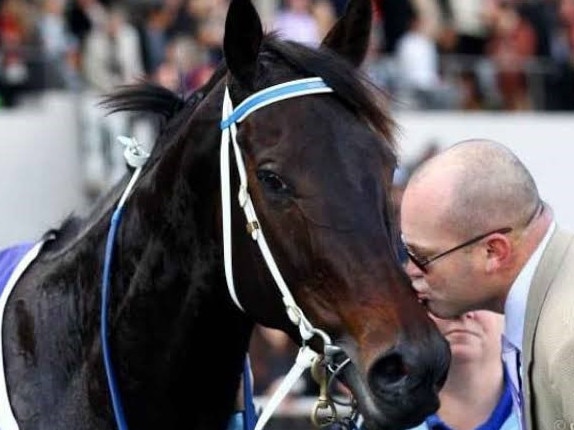Why Black Caviar is one of the greatest racehorses of all time
Bart Cummings said you shouldn’t compare the champions. But Black Caviar, the greatest racehorse of all-time, must be celebrated.
Victoria
Don't miss out on the headlines from Victoria. Followed categories will be added to My News.
Don’t compare champions, the great Bart Cummings warned us, when people talked about Black Caviar in the same breath as the other great ones.
Bart would know.
He was a champion himself. The Bradman of horse trainers prepared some of the better gallopers of the last half of the 20th century and a wonderful animal called Saintly early in this one.
Apart from his own string of big winners, the Cups King had seen a cavalcade of champions come and go since World War II. But none of that long list of stars was as astounding as Black Caviar, the phenomenal sprinter who left us on Saturday just hours after delivering a foal that has a bit to live up to.
At her pet distances of between 1000m and 1300m, Black Caviar was unbeatable.
She even nailed the one race she was entitled to lose.

When she “fell over the line” in the 2012 Diamond Jubilee Stakes at Royal Ascot she won on sheer grit, despite a nagging injury, an exhausting flight across the world, and a heavy horse’s built-in disadvantage on a steeply rising track, something she’d never encountered before.
Some British cynics tended to downplay the Australian heroine’s narrow win that day, as if she had been over-estimated and over hyped.
But they were wrong, just as they were wrong when they predicted that imported stars could or would or should humble another “upstart” (the one named Winx) in various Cox Plates a decade later.
Australian sprinters are among the best in the world. Since Choisir won at Ascot in 2003, Australian entrants have beaten or run close to Europe’s best short-course horses regularly in England, as Asfoora proved just eight weeks ago when she became the sixth Aussie winner of the former King’s Stand Stakes.
As good as those Australian raiders were, no-one should seriously suggest that worthy and even wonderful winners like Takeover Target, Miss Andretti and Nature Strip were in Black Caviar’s league.

Like Usain Bolt in the men’s 100m, at her peak “Nellie” was in a league of her own.
And she won every race she ran in despite being naturally so heavy that it put extra pressure on a racehorse’s most vulnerable parts — the front legs from the knee down.
Black Caviar’s story is not just one miracle but two: not only was she born miraculously fast but it was a miracle that her trainer Peter Moody could keep her sound and unbeaten in 25 starts.
It wasn’t easy.
Moody was tortured by the endless highwire act of training an unbeaten horse whose legs were a week-to-week proposition. There is a reason why, long after Black Caviar was safely retired to stud unbeaten, a younger trainer called Chris Waller often called “Moods” for advice, maybe even reassurance, because he now faced the same pressure that Moody had for season after season.
No one else but Moody could quite grasp the pressure, a point that Waller makes powerfully in the new film A Horse Named Winx.
Both Waller and his wife Stephanie are on the point of tears talking about how gruelling it was.
Moody isn’t one for crying but knows exactly how it feels.
At the height of the Black Caviar’s fame, he sometimes let off pressure with mock belligerence in interviews, some of them very funny to look back on.
The wise warn against comparing the great, but while comparisons between individuals and eras are pointless, they are also inevitable.
Racing runs on comparisons — without a difference of opinion there would be no racing at all.

Still, to get some idea of Black Caviar’s astonishing natural superiority, you have to look across three centuries of thoroughbred breeding.
If she is not the greatest racehorse of all time, she is probably the fastest over her distance, and is certainly one of the three greatest race mares in history.
One, of course, is Winx, whose astonishing ability ranged from the upper limit of Black Caviar’s winning distances, 1400m, to perhaps double that.
Winx did not win beyond 2400m but both her trainer and her regular rider, Hugh Bowman, calmly concede she could have won a Melbourne Cup over 3200m if you wanted to put her through that ordeal.
You have to go back 150 years to find another fitting comparison with Black Caviar.
That is a Hungarian mare named Kinscem, who won 54 races in five countries from 900m to 3200m.
Club experts and pub bores will tell you that old-time stuff doesn’t really count.
But the truth is that Kinscem beat every horse she ran against.
That is all a racehorse can do. And that’s what the great Black Caviar did, dicky legs and all.
Don’t compare champions, Bart told us. Celebrate them.





